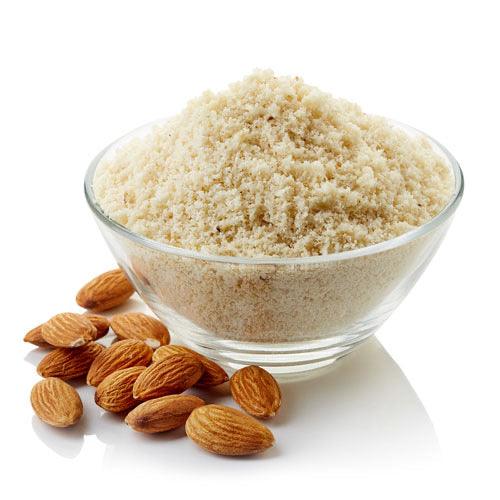
Imagine transforming your family's favorite recipes into healthier, more nutritious meals without compromising taste or texture. If you're a health-conscious, active, and outdoor-loving individual or family, the switch from traditional wheat flour to almond flour could be a game changer for you. In recent years, almond flour has gained popularity as a versatile, nutritious alternative for baking and cooking, particularly among those who prioritize a gluten-free, low-carb, or keto-friendly diet.
This article will dive deep into the benefits of almond flour, why it's an excellent choice for your family's nutritional needs, and offer delicious, family-friendly recipes that you can easily incorporate into your healthy lifestyle. Whether you're whipping up pancakes on a Sunday morning or preparing an energy-packed snack for your kids, almond flour can become a staple in your kitchen. Let's explore why!
1. What is Almond Flour?
Almond flour is made by grinding blanched almonds into a fine powder, offering a grain-free, gluten-free alternative to traditional wheat flour. It's different from almond meal, which is ground from whole almonds with their skins intact, resulting in a coarser texture.
Nutritional Profile:
Almond flour is packed with healthy fats, protein, vitamins, and minerals, making it a nutritional powerhouse. Here’s a breakdown of its key components:
- Healthy Fats: Almond flour is rich in monounsaturated fats, which are beneficial for heart health.
- Protein: With 6 grams of protein per ounce, it provides a plant-based protein source.
- Fiber: It contains about 3 grams of fiber per ounce, aiding in digestion.
- Vitamin E: Almonds are an excellent source of this antioxidant, which promotes skin and immune health.
- Magnesium: Known for its role in supporting muscle and bone health, magnesium is abundant in almond flour.
Why It Matters:
For active families who enjoy outdoor activities and prioritize fitness, incorporating nutrient-dense foods like almond flour can enhance energy levels and overall well-being. It provides a slower-burning source of fuel that helps sustain energy, which is perfect for busy parents and active children.
2. Health Benefits of Almond Flour
a. Low-Carb, Keto, and Paleo-Friendly
If you're following a low-carb, keto, or paleo diet, almond flour is an excellent alternative to traditional flours. With only 2 grams of net carbs per 1/4 cup, almond flour fits seamlessly into low-carb recipes without spiking blood sugar levels, making it an ideal choice for those managing blood sugar levels or looking to reduce refined carbohydrate intake.
b. Gluten-Free and Grain-Free
For families with gluten sensitivities or celiac disease, almond flour offers a naturally gluten-free option that’s still light and fluffy. It's a fantastic option for creating baked goods that don't sacrifice texture, allowing those with dietary restrictions to enjoy foods they love.
Real-Life Example:
Sarah, a mother of two active teenagers, switched to almond flour when her son was diagnosed with gluten sensitivity. Since then, she has created gluten-free versions of their favorite pancakes, muffins, and even pizza crust, keeping her family happy and healthy.
c. High in Protein and Fiber
Almond flour's high protein content helps maintain muscle mass and repair, which is crucial for growing children and parents who work out. The fiber in almond flour aids digestion and promotes feelings of fullness, which can help with weight management and overall gut health.
d. Rich in Antioxidants and Nutrients
The vitamin E content in almond flour helps combat inflammation and oxidative stress. Additionally, the magnesium found in almond flour is known to support healthy nerve function, bone density, and muscle recovery—essential for both parents and children who lead an active lifestyle.
3. Delicious Family-Friendly Recipes with Almond Flour
Now that we’ve covered the health benefits, let’s dive into some easy and delicious recipes that incorporate almond flour into your family's meals.
a. Almond Flour Pancakes
Perfect for a weekend breakfast, these almond flour pancakes are light, fluffy, and packed with nutrients. They provide a high-protein, low-carb start to the day.
Ingredients:
- 1 cup almond flour
- 2 large eggs
- 1/4 cup almond milk
- 1 tsp baking powder
- 1 tsp vanilla extract
- A pinch of salt
Instructions:
- Mix the almond flour, eggs, almond milk, baking powder, vanilla, and salt in a bowl.
- Heat a non-stick pan over medium heat, lightly greased with coconut oil.
- Pour 1/4 cup batter onto the pan for each pancake.
- Cook until bubbles form on the surface, then flip and cook the other side until golden brown.
Serve with fresh berries and a drizzle of maple syrup for a nutritious and delicious breakfast!
b. Almond Flour Energy Bites
These no-bake energy bites are a perfect post-workout snack or lunchbox treat for kids. They’re quick to make and loaded with protein, fiber, and healthy fats.
Ingredients:
- 1 cup almond flour
- 1/4 cup almond butter
- 1/4 cup honey or maple syrup
- 1/4 cup chia seeds
- 1/4 cup dark chocolate chips
Instructions:
- In a bowl, mix the almond flour, almond butter, and honey until well combined.
- Stir in chia seeds and chocolate chips.
- Roll the mixture into small bite-sized balls and refrigerate for 30 minutes before serving.
These energy bites are packed with nutrients and are perfect for an on-the-go snack that will keep your kids fueled for their next adventure.
c. Almond Flour Pizza Crust
For pizza night, this gluten-free almond flour crust is a game-changer. It’s easy to make and provides a healthier alternative to traditional pizza dough.
Ingredients:
- 2 cups almond flour
- 1 large egg
- 2 tbsp olive oil
- 1/4 tsp salt
- 1/2 tsp garlic powder
Instructions:
- Preheat oven to 375°F (190°C).
- In a bowl, mix almond flour, egg, olive oil, salt, and garlic powder until a dough forms.
- Roll the dough into a ball and place it between two pieces of parchment paper.
- Roll out the dough to your desired thickness and transfer to a baking sheet.
- Bake for 10-12 minutes until golden, then add your favorite toppings and bake for an additional 5-7 minutes.
4. Analysis and Insights
The growing popularity of almond flour aligns with larger dietary trends focused on gluten-free, grain-free, and low-carb lifestyles. Many families are becoming more conscious of the quality of carbohydrates they consume, especially when aiming to balance energy, manage weight, and promote overall health. Almond flour offers an ideal solution, providing an alternative to wheat flour that not only satisfies dietary restrictions but also adds nutritional value.
Opportunities for Families
For active families who enjoy outdoor adventures, meals made with almond flour can offer long-lasting energy without the sugar crashes associated with traditional flour-based products. Additionally, for those managing food sensitivities, almond flour opens up a world of possibilities without sacrificing taste or texture.
5. Conclusion
Almond flour is a nutritious and versatile alternative to traditional wheat flour, perfect for families who prioritize health, fitness, and wholesome eating. From its rich nutritional profile to its compatibility with low-carb, keto, and gluten-free diets, almond flour can help you create delicious, family-friendly meals that support both brain, muscle, and bone health.
Whether you're enjoying almond flour pancakes for breakfast, energy bites after a workout, or gluten-free pizza for dinner, this superfood ingredient has endless possibilities. By incorporating almond flour into your meals, you can empower your family's health and well-being—without sacrificing flavor.
Call to Action
Ready to make the switch? Try one of these recipes this week and see how almond flour can elevate your family’s meals. For more inspiration, be sure to explore other healthy recipes using almond flour and watch your family grow stronger and healthier with every bite.
References and Credibility:
-
Harvard T.H. Chan School of Public Health. (2017). "Nuts and heart health."
-
American Heart Association. (2020). "Trans Fats and Heart Disease." Available at: American Heart Association
-
Guasch-Ferré, M., Liu, X., Malik, V. S., et al. (2017). "Nut consumption and risk of cardiovascular disease."




